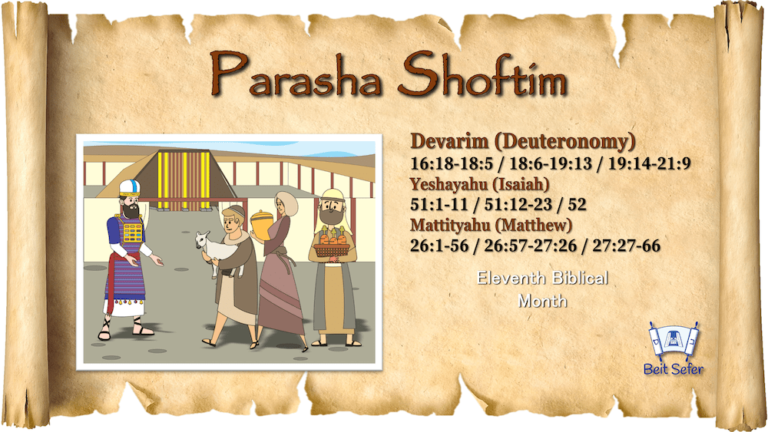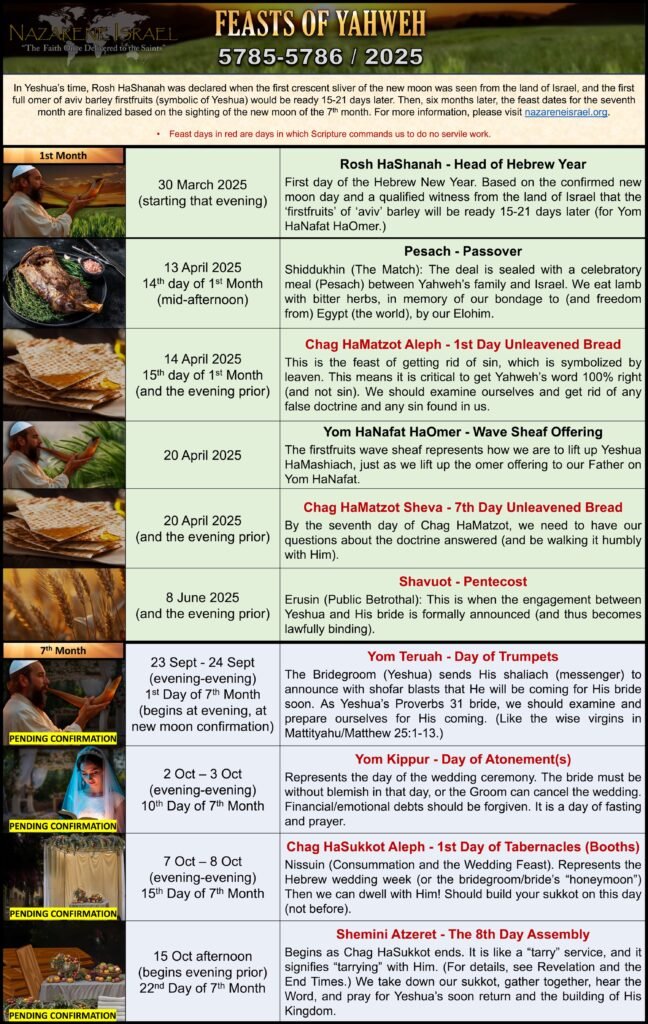|
B’reisheet
|
1 |
B’reisheet
“In the beginning”
|
1) Genesis 1:1-2:3
2) 2:4-4:26
3) 5:1-6:8
|
1) Isaiah 42:5-17
2) 42:18-25
3) 43:1-43:10
|
1) John 1:1-5
2) 1:6-13
3) 1:14-18
|
| 2 |
Noach
“Noah”
|
1) Genesis 6:9-8:14
2) 8:15-10:32
3) 11:1-11:32
|
1) Isaiah 54:1-6
2) 54:7-17
3) 55:1-5
|
1) Luke 1:5-25
2) 1:26-56
3) 1:57-80
|
| 3 |
Lech Lecha
“Get out of your [country]”
|
1) Genesis 12:1-13:18
2) 14:1-15:21
3) 16:1-17:27
|
1) Isaiah 40:1-31
2) 41:1-20
3) 41:21-29
|
1) Matthew 1:1-17
2) 1:18-21
3) 1:22-25
|
| 4 |
Vayeira
“Then He [Yahweh] appeared”
|
1) Genesis 18:1-33
2) 19:1-20:18
3) 21:1-22:24
|
1) 2 Kings 4:1-17
2) 4:18-37
3) 4:38-44
|
1) Luke 2:1-21
2) 2:22-38
3) 2:39-52
|
| 5 |
Chayei Sarah
“Life of Sarah”
|
1) Genesis 23:1-24:9
2) 24:10-52
3) 24:53-25:18
|
1) 1 Kings 1:1-10
2) 1:11-27
3) 1:28-53
|
1) Matthew 2:1-12
2) 2:13-18
3) 2:19-23
|
| 6 |
Toldot
“Genealogy”
|
1) Genesis 25:19-26:22
2) 26:23-27:27
3) 27:28-28:9
|
1) Malachi 1:1-14
2) 2:1-9
3) 2:10-17
|
1) Matthew 6:1-15
2) 6:16-34
3) Hebrews 12
|
| 7 |
Vayetze
“And he [Ya’akov] went out”
|
1) Genesis 28:10-30:13
2) 30:14-31:16
3) 31:17-32:2
|
1) Hosea 12:1-14
2) 13:1-16
3) 14:1-9
|
1) Matthew 3:1-12
2) 3:13-17 – 4:1-11
3) 4:12-25
|
| 8 |
Vayishelach
“And he [Ya’akov] sent”
|
1) Genesis 32:3-33:20
2) 34:1-35:15
3) 35:16-36:43
|
1) Hosea 11
2) Hosea 12
3) Obadiah 1
|
1) John 1:1-28
2) 1:29-51
3) 2
|
| 9 |
Vayeshev
“And he [Ya’akov] dwelt”
|
1) Genesis 37:1-36
2) 38:1-30
3) 39:1-40:23
|
1) Amos 2:1-16
2) 3:1-8
3) 3:9-15
|
1) John 2
2) 3
3) 4
|
| 10 |
Miketz
“At the end [of two full years]”
|
1) Genesis 41:1-52
2) 41:53-43:15
3) 43:16-44:17
|
1) Zechariah 3:1-10
2) 4:1-7
3) 4:8-14
|
1) Luke 4:1-13
2) 4:14-30
3) 4:31-44
|
| 11 |
Vayigash
“And he [Judah] came near”
|
1) Genesis 44:18-45:27
2) 45:28-46:27
3) 46:28-47:27
|
1) Ezekiel 37:1-14
2) 37:15-22
3) 37:23-28
|
1) John 5:1-18
2) 5:19-29
3) 5:30-47
|
| 12 |
Vayechi
“And he [Ya’akov] lived”
|
1) Genesis 47:28-48:22
2) 49:1-49:26
3) 49:27-50:26
|
1) 1 Kings 2:1-9
2) 2:10-35
3) 2:36-46
|
1) Luke 4:31-37
2) 4:38-44
3) 5:1-11
|
|
Shemote
|
13 |
Shemote
“Names”
|
1) Exodus 1:1-2:25
2) 3:1-4:17
3) 4:18-6:1
|
1) Isaiah 27
2) 28
3) 29
|
1)Luke 9:1-22
2) 9:23-42
3) 9:43-62
|
| 14 |
Va’era
“And I [Yahweh] appeared”
|
1) Exodus 6:2-7:7
2) 7:8-8:15
3) 8:16-9:35
|
1) Isaiah 66:1-6
2) 66:7-14
3) 66:15-24
|
1)Matthew 12:1-21
2) 12:22-37
3) 12:38-50
|
| 15 |
Bo
“Go [in to Pharaoh]”
|
1) Exodus 10:1-11:3
2) 11:4-12:28
3) 12:29-13:16
|
1) Jeremiah 46:1-10
2) 46:11-19
3) 46:20-28
|
1) Mark 3:1-12
2) 3:13-21
3) 3:22-35
|
| 16 |
B’shalach
“When he [Pharaoh] let go”
|
1) Exodus 13:17-14:31
2) 15:1-27
3) 16:1-17:16
|
1) Judges 4:1-16
2) 4:17-24
3) 5
|
1) Matthew 5:1-16
2) 5:17-32
3) 5:33-48
|
| 17 |
Yitro
“Jethro”
|
1) Exodus 18:1-27
2) 19:1-25
3) 20:1-20:26
|
1) Isaiah 6-7:9
2) 7:10-8:10
3) 8:11-9:21
|
1) Matthew 6:1-24
2) 6:25-34 – 7:1-11
3) 7:12-29 – 8:1
|
| 18 |
Mishpatim
“Laws”
|
1) Exodus 21:1-22:3
2) 22:4-23:19
3) 23:20-24:18
|
1) Jeremiah 33:1-13
2) 33:14-26
3) 34
|
1) John 10:1-21
2) 10:22-31
3) 10:32-42
|
| 19 |
Terumah
“Offering”
|
1) Exodus 25:1-40
2) 26:1-30
3) 26:31-27:19
|
1) 1 Kings 5:1-18
2) 6:1-10
3) 6:11-38
|
1) John 15
2) 16
3) 17
|
| 20 |
Tetzaveh
“And you shall command [the children of Israel]”
|
1) Exodus 27:20-28:30
2) 28:31-29:18
3) 29:19-30:10
|
1) 1 Samuel 15:1-9
2) 15:10-23
3) 15:24-35
|
1) Mark 4:35-41
2) 5:1-20
3) 5:21-43
|
| 21 |
Ki Tisa
“When you take the census”
|
1) Exodus 30:11-31:17
2) 31:18-33:11
3) 33:12-34:35
|
1) Ezekiel 36:1-21
2) 36:22-38
3) 37
|
1) Matthew 15:1-20
2)15:21-39
3)23
|
| 22 |
Vayakhel/Pekudei
“And he [Moshe] assembled” / “The amount of [Tabernacle]”
|
1) Exodus 35:1-37:16
2) 37:17-39:21
3) 39:22-40:38
|
1) 2 Kings 22:1-20
2) 23:1-20
3) 23:21-37
|
1) John 14,
2) 1 John 2
3) 5
|
|
Vayiqra
|
23 |
Vayiqra
“And He [Yahweh] called”
|
1) Leviticus 1:1-2:16
2) 3:1-4:26
3) 4:27-5:26
|
1) Jeremiah 7:1-20
2) 7:21-34
3) Hosea 8
|
1) Romans 6
2) Hebrews 10:1-18
3) 10:19-39
|
| 24 |
Tzav
“Command”
|
1) Leviticus 6:1-7:10
2) 7:11-38
3) 8:1-36
|
1) Malachi 3:1-12
2) 3:13-18
3) 4
|
1) Matthew 25:1-13
2) 25:14-30
3) 25:31-46
|
| 25 |
Shemini
“The eighth [day]”
|
1) Leviticus 9:1-10:11
2) 10:12-11:32
3) 11:1-47
|
1) 2 Samuel 6-7
2) Proverbs 23
3) Psalm 78
|
1) Acts 10:1-23
2) 10:24-33
3) 10:34-48
|
| 26 |
Tazria/Metzora
“When [a woman] conceives” / “Leper”
|
1) Leviticus 12:1-13:39
2) 13:40-14:32
3) 14:33-15:33
|
1) Proverbs 6:16-19
2) 31:1-9
3) 31:10-31
|
1) Colossians 3:1-8
2) 3:9-17
3) 3:18-25
|
| 27 |
Acharei Mot
“After the death [of the sons of Aaron]”
|
1) Leviticus 16:1-34
2)17:1-16
3)18:1-18:30
|
1) Ezekiel 22:1-10
2) 22:11-22
3) 22:23-31
|
1) Ephesians 5:1-10
2) 5:11-21
3) 5:22-33
|
| 28 |
Kedoshim
“Set apart ones [Saints]”
|
1) Leviticus 19:1-18
2) 19:19-37
3) 20:1-20:27
|
1) Amos 9:1-6
2) 9:7-10
3) 9:11-15
|
1) 1 Corinthians 6
2) Galatians 5:1-15
3) 5:16-26
|
| 29 |
Emor
“Speak [to the priests]”
|
1) Leviticus 21:1-22:16
2) 22:17-23:22
3) 23:23-24:23
|
1) Ezekiel 44:1-8
2) 44:9-18
3) 44:19-31
|
1) Luke 11:1-36
2) 11:37-54 – 12:1-21
3) 12:22-59
|
| 30 |
Behar
“On the mount [Sinai]”
|
1) Leviticus 25:1-24
2) 25:25-38
3) 25:39-26:2
|
1) Jeremiah 32:1-15
2) 32:16-35
3) 32:36-44
|
1) Luke 13:1-9
2) 13:10-21
3) 13:22-35
|
| 31 |
Bechukotai
“[If you walk] in My statutes”
|
1) Leviticus 26:3-46
2) 27:1-21
3) 27:22-34
|
1) Jeremiah 16:1-13
2) 16:14-21 – 17:1-13
3) 17:14-27
|
1) Luke 14:1-24
2) 14:25-35 – 15:1-10
3) 15:11-32
|
|
Bemidbar
|
32 |
Bemidbar
“In the wilderness”
|
1) Numbers 1:1-54
2) 2:1-3:13
3) 3:14-4:20
|
1) Hosea 2:1-9
2) 2:10-15
3) 2:16-23
|
1) Luke 16:1-18
2) 16:19-31 – 17:1-10
3) 17:11-37
|
| 33 |
Nasso
“Take [a census]”
|
1) Numbers 4:21-5:10
2) 5:11-6:27
3) 7:1-89
|
1) Judges 13
2) 14
3) 15
|
1) John 11:1-27
2) 11:28-44
3) 11:45-57
|
| 34 |
Beha’alotcha
“When you arrange [the lamps]”
|
1) Numbers 8:1-9:14
2) 9:15-10:34
3) 10:35-12:16
|
1) Zechariah 2
2) 3
3) 4
|
1) Luke 17:1-19
2) 17:20-37 – 18:1-14
3) 18:15-43
|
| 35 |
Shelach
“You [Moshe] send [men]
|
1) Numbers 13:1-14:7
2) 14:8-15:7
3) 15:8-15:41
|
1) Joshua 1:1-9
2) 1:10-18
3) 2
|
1) Matthew 10
2) Acts 13:1-25
3) 13:26-52
|
| 36 |
Korach
“Korah”
|
1) Numbers 16:1-50
2) 17:1-18:7
3) 18:8-18:32
|
1) 1 Samuel 11:1-11
2) 11:12-15 – 12:1-12
3) 12:13-25
|
1) John 19:1-15
2) 19:16-30
3) 19:31-42
|
| 37 |
Chukat
“Ordinance”
|
1) Numbers 19:1-20:6
2) 20:7-21:9
3) 21:10-22:1
|
1) Judges 11:1-10
2) 11:11-28
3) 11:29-40
|
1) 1 Peter 4:1-8
2) 4:9-14
3) 4:15-19
|
| 38 |
Balak
“Balak”
|
1) Numbers 22:2-38
2) 22:39-23:26
3) 23:27-25:9
|
1) 2 Kings 5,
2) Micah 5
3) 6
|
1) Jude 1:1-8
2) 1:9-16
3) 1:17-25
|
| 39 |
Pinchas
“Phinehas”
|
1) Numbers 25:10-26:51
2) 26:52-28:15
3) 28:16-30:1
|
1) 1 Kings 18
2) 19
3) Psalm106
|
1) Matthew 5:1-16
2) 5:17-30
3) 5:31-48
|
| 40 |
Mattot/Massei
“Tribes” / “Journey”
|
1) Numbers 30:2-32:42
2) 33:1-34:29
3) 35:1-36:13
|
1) Jeremiah 2:1-17
2) 2:18-37 – 3:1-5
3) 3:6-25
|
1) Ephesians 5:1-21
2) 5:22-33 – 6:1-4
3) 6:5-24
|
|
Devarim
|
41 |
Devarim
“[These are] the words”
|
1) Deuteronomy 1:1-2:1
2) 2:2-30
3) 2:31-3:22
|
1) Isaiah 1:1-10
2) 1:11-20
3) 1:21-31
|
1) Mark 14:1-25
2) 14:26-50
3) 14:51-72
|
| 42 |
Va’etchanan
“And I pleaded [to Yahweh]”
|
1) Deuteronomy 3:23-4:40
2) 4:41-6:3
3) 6:4-7:11
|
1) Isaiah 40:1-8
2) 40:9-20
3) 40:21-31
|
1) Luke 22:1-23
2) 22:24-46
3) 22:47-71
|
| 43 |
Ekev
“As a consequence [of having heard]”
|
1) Deuteronomy 7:12-9:3
2) 9:4-10:11
3) 10:12-11:25
|
1) Isaiah 49:1-7
2) 49:8-26
3) 50
|
1) John 13
2) 14
3) 15
|
| 44 |
Re’eh
“See”
|
1) Deuteronomy 11:26-12:28
2) 12:29-14:29
3) 15:1-16:17
|
1) Isaiah 66:1-6
2) 66:7-14
3) 66:15-24
|
1) Acts 15:1-21
2) 15:22-35
3) 15:36-41
|
| 45 |
Shoftim
“Judges”
|
1) Deuteronomy 16:18-18:5
2) 18:6-19:13
3) 19:14-21:9
|
1) Isaiah 51:1-11
2) 51:12-23
3) 52
|
1) Matthew 26:1-56
2) 26:57-75 – 27:1-26
3) 27:27-66
|
| 46 |
Ki Tetze
“When you go out [to war]”
|
1) Deuteronomy 21:10-23:8
2) 23:9-24:13
3) 24:14-25:19
|
1) Isaiah 54:1-6
2) 54:7-11
3) 54:12-17
|
1) Luke 22:1-46
2) 22:47-71 – 23:1-17
3) 23:18-56
|
| 47 |
Ki Tavo
“When you come into [the land]
|
1) Deuteronomy 26:1-27:10
2) Deuteronomy 27:11-28:6
3) 28:7-29:8
|
1) Isaiah 60:1-7
2) 60:8-14
3) 60:15-22
|
1) Luke 22:1-46
2) 22:47-71 – 23:1-17
3) 23:18-56
|
| 48 |
Nitzavim
“Standing [before Yahweh]”
|
1) Deuteronomy 29:9-29:29
2) Deuteronomy 30:1-30:10
3) 30:11-30:20
|
1) Isaiah 61
2) 62
3) 63
|
1) Luke 24:1-12
2) 24:13-35
3) 24:36-53
|
| 49 |
Vayelech
“And he [Moshe] went”
|
1) Deuteronomy 31:1-8
2) 31:9-13
3) 31:14-30
|
1) Hosea 14
2) Micah 7
3) Joel 2
|
1) James 1:1-18
2) 1:19-27 – 2:1-13
3) 2:14-26
|
| 50 |
Ha’azinu
“Listen”
|
1) Deuteronomy 32:1-32:12
2) 32:13-39
3) 32:40-52
|
1) 2 Samuel 22:1-17
2) 22:18-35
3) 22:36-51
|
1) 1 Corinthians 1:1-9
2) 1:10-17
3) 1:18-31
|
| 51 |
Vezot Haberakhah
“And this is the blessing”
|
1) Deuteronomy 33:1-17
2) 33:18-29
3) 34:1-12
|
1) Joshua 1:1-9
2) 1:10-15
3) 1:16-18
|
1) Matthew 5
2) 6
3) 7
|




